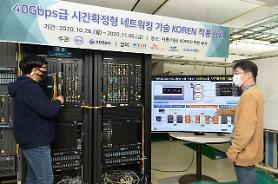
[Courtesy of LG Electronics]
SEOUL -- In a bid to secure an early lead in the development of 6G technologies, LG Electronics teamed up with a state research body and Keysight Technologies, an American manufacturer of electronics test and measurement equipment and software, to develop source technologies related to terahertz (THz), a unit of frequency defined as one trillion cycles per second, and establish a verification system.
LG Electronics said it has signed a memorandum of understanding with Keysight and the state-run Korea Advanced Institute of Science & Technology (KAIST). They will gradually develop THz-related source technologies, establish a test infrastructure, upgrade measuring equipment, and study the environment of radio waves. Keysight has provided design and test tools.
"Global competition to preoccupy technology for next-generation 6G mobile telecommunication is intensifying," LG's future technology head Kim Byoung-hoon said in a statement on March 23. "Through this agreement, we will systematically establish a process from the development of source technology to the verification of THz wireless transmission, and secure leadership in the standardization and commercialization phase of 6G mobile communication."
LG has set up a joint 6G research center with KAIST. In August 2020, the Korea Research Institute of Standards and Science (KRISS) joined forces with LG and KAIST to develop THz technologies, establish infrastructure for the verification of technologies, discover frequencies, and analyze characteristics of channels.
As a frontrunner in disseminating 5G mobile services, South Korea aims to achieve the world's first commercialization of 6G mobile telecommunication in 2028. For the pre-emptive development of 6G technologies, the Seoul government has proposed a state-sponsored preliminary feasibility study.
6G has a shorter transmission distance than 5G. Base stations should be built more closely than 5G to eliminate shaded areas. Because 6G is five times faster than 5G, scientists say it will open a completely new era. Researchers at the University of Oulu think the future-generation mobile network can transfer terabits per second, creating near-instant microsecond connectivity between societies.
Copyright ⓒ Aju Press All rights reserved.




